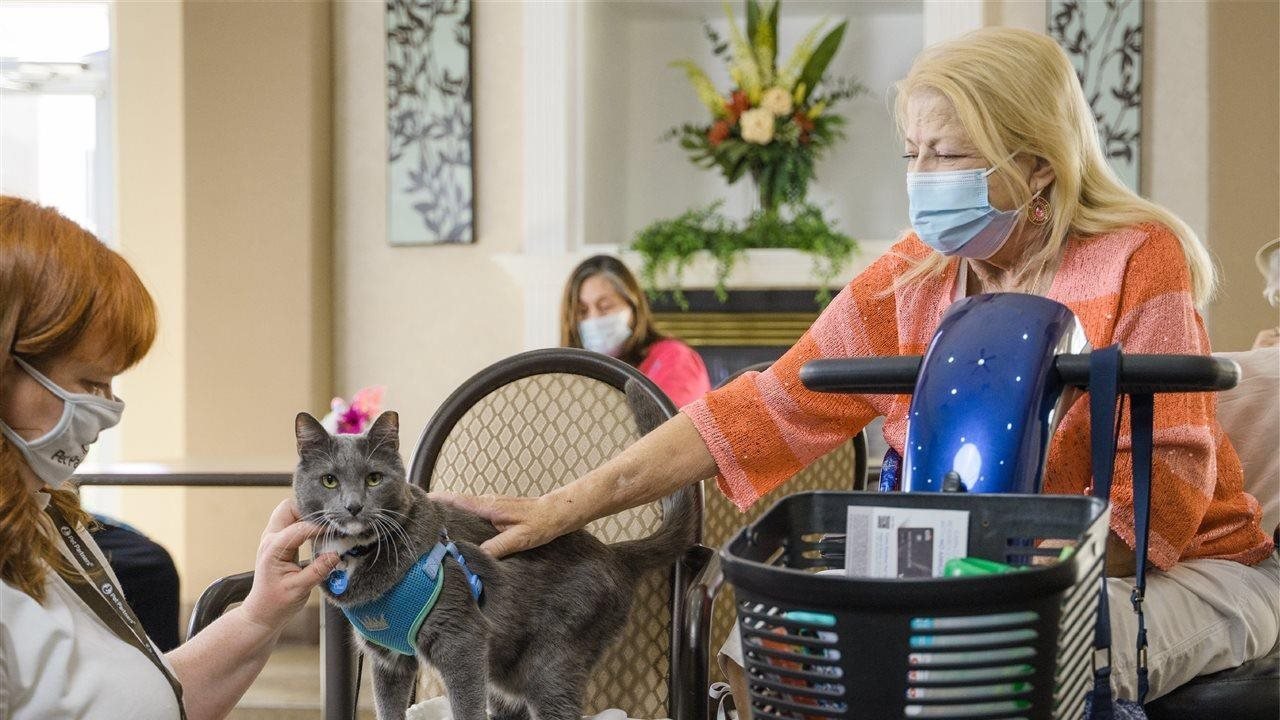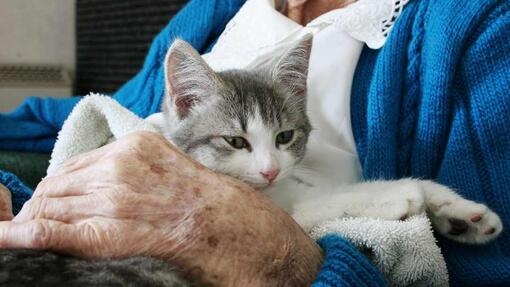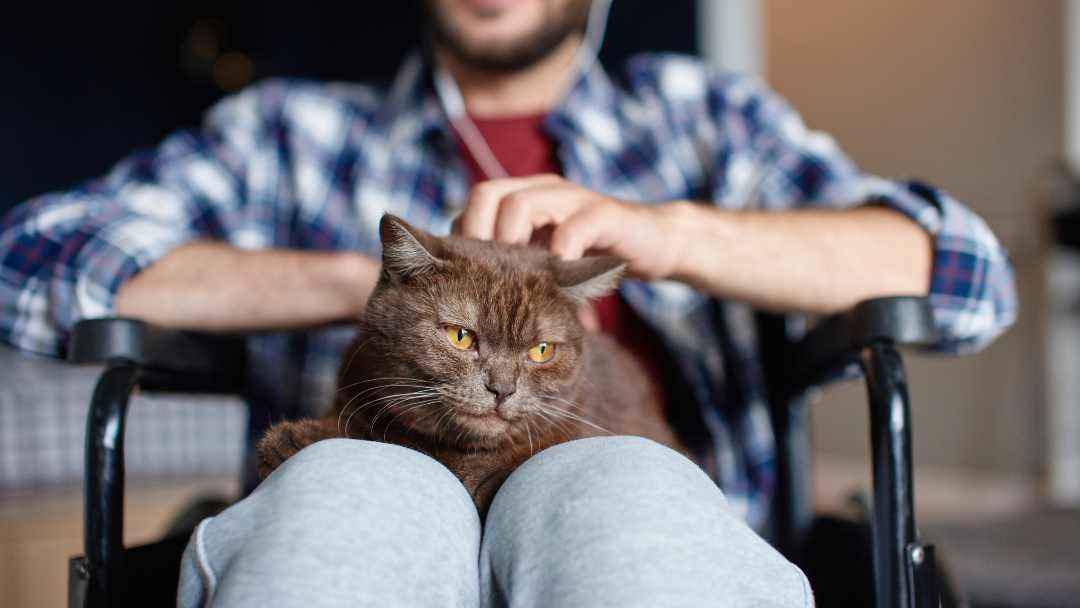Introduction
Therapy animals have long been recognized for their ability to provide comfort, support, and healing to those in need. Among the various types of therapy animals, therapy felines are on the rise in popularity. These specially trained cats offer unique benefits to individuals with mental health challenges or those recovering from physical ailments. In this article, we will explore the definition of therapy felines and the requirements for their training and certification. We will also examine the significant impact these furry companions have on mental health, as well as their roles in hospitals, schools, and assisted living facilities. Additionally, we will discuss their positive impact on special needs individuals and their invaluable role in trauma and crisis situations. Finally, we will touch upon the future of therapy felines and consider their potential for bringing comfort into the lives of individuals seeking emotional support.
The benefits of therapy animals
Therapy animals, including therapy felines, have been proven to provide numerous benefits to individuals in need. These animals offer emotional support, companionship, and a sense of calm. Interacting with therapy animals has been shown to reduce stress and anxiety levels, promote relaxation, and improve overall mood. Additionally, therapy animals can offer a sense of comfort and provide a source of distraction from pain or distressing thoughts. Studies have also found that therapy animals can help lower blood pressure and increase feelings of happiness and wellbeing. Overall, therapy animals play a crucial role in enhancing mental health and overall quality of life for those who interact with them.
The rise of therapy felines

In recent years, there has been a noticeable increase in the popularity and recognition of therapy felines. These specially trained cats are being utilized more frequently in various settings to provide emotional support and comfort to individuals. The rise of therapy felines can be attributed to the growing understanding of the benefits that animals can have on mental health. As studies continue to show the positive impact of animal-assisted therapy, more organizations and institutions are incorporating therapy felines into their programs. This rise in popularity is providing individuals with new opportunities for healing and emotional well-being through the companionship and presence of these remarkable feline helpers.
What are Therapy Felines?
Therapy felines, also known as therapy cats, are specially trained domestic cats that provide emotional support and comfort to individuals in various settings. These felines are selected for their calm and friendly demeanor, making them ideal for interacting with people of all ages. Therapy felines differ from service animals as they do not have specific tasks or duties but instead focus on providing companionship and a sense of calm. These cats undergo training to be able to visit hospitals, nursing homes, schools, and other facilities to assist individuals who may benefit from their presence.
Defining therapy felines
Therapy felines are specially trained cats that provide emotional support and companionship to individuals in various settings. Unlike service animals, which have specific tasks to assist individuals with disabilities, therapy felines focus on providing comfort and improving mental well-being. These cats are typically friendly, calm, and responsive to human interaction. They undergo extensive training to ensure they are well-behaved and comfortable in different environments. Therapy felines can be found in hospitals, nursing homes, schools, and even crisis situations, where their presence can have a positive impact on the individuals they interact with. Their main role is to offer unconditional love and support to those in need.
Training and certification requirements
When it comes to therapy felines, training and certification requirements play a crucial role. While cats are known for their independent nature, therapy felines undergo specific training to prepare them for their role in providing emotional support. The training involves teaching them socialization skills, obedience, and how to interact appropriately with humans in various environments. Moreover, certification is necessary to ensure that the therapy feline meets certain standards of behavior and temperament. This certification process typically involves evaluations by professionals who assess the cat's behavior, temperament, and suitability for therapy work. The training and certification requirements ensure that therapy felines are well-prepared to make a positive impact on the mental health of individuals they interact with.
The Impact of Therapy Felines on Mental Health
Therapy felines have a remarkable impact on mental health, providing a range of benefits to individuals in need. These furry companions are known for their ability to reduce stress and anxiety, offering comfort during challenging times. The presence of therapy felines can also improve mood and emotional well-being, acting as a source of support and solace. Their calming presence and gentle nature create a soothing environment, promoting relaxation and alleviating mental strain. Through their unconditional love and nonjudgmental companionship, therapy felines play a vital role in enhancing mental health and overall emotional well-being.
Reducing stress and anxiety

Therapy felines have shown remarkable abilities in reducing stress and anxiety among individuals. The gentle presence of these furry companions can bring a sense of calm and relaxation to those who are feeling overwhelmed or anxious. Research has found that interacting with therapy felines can lower levels of cortisol, often referred to as the "stress hormone," while increasing the release of oxytocin, known as the "bonding hormone." This chemical response in the body helps to alleviate stress and promote a sense of well-being. Whether through cuddling, petting, or simply being in the same space, therapy felines provide a soothing presence that can significantly reduce stress and anxiety levels in individuals.
Improving mood and emotional well-being

Therapy felines have proven to be invaluable when it comes to improving mood and emotional well-being. Spending time with these furry companions has been shown to increase the production of endorphins, which are natural mood boosters. The presence of a therapy feline can also help reduce feelings of loneliness and isolation, providing individuals with a sense of comfort and companionship. The soothing nature of cats can help in relieving stress and anxiety, allowing individuals to relax and unwind. Interacting with therapy felines can evoke positive emotions, such as happiness and joy, enhancing overall emotional well-being. Whether it's through cuddling, petting, or playing, these adorable creatures have a way of lifting the spirits and bringing smiles to those in their presence.
Therapy Felines in Hospitals and Care Facilities

Therapy felines have become valuable members of healthcare teams in hospitals and care facilities. Their presence has been shown to have numerous benefits for patients and staff alike. These furry companions offer assistance in healing and recovery processes by providing a sense of comfort and ease. Research has highlighted how therapy felines can reduce stress and anxiety levels, promoting a more relaxed atmosphere in these settings. Additionally, they play a crucial role in providing companionship and emotional support to patients, particularly those who may be feeling isolated or lonely during their stay. Doctors, nurses, and caregivers also benefit from the presence of therapy felines as they help create a positive and uplifting atmosphere within the healthcare environment.
Assisting in healing and recovery

Therapy felines play a crucial role in assisting individuals in their healing and recovery process. The presence of these furry companions has been shown to have a positive impact on patients in hospitals and care facilities. Cats have a calming effect, which can help reduce anxiety and stress levels, allowing patients to focus on their healing. Additionally, the soothing nature of therapy felines can provide comfort and solace during challenging times, promoting emotional well-being. The gentle touch and unconditional love they offer create a safe and nurturing environment for patients, aiding in their physical and emotional recovery. The bond formed with these therapy animals can truly make a difference in the healing journey.
Providing companionship and comfort

Providing companionship and comfort: Therapy felines play a crucial role in providing companionship and comfort to individuals in hospitals and care facilities. These furry companions offer unconditional love, warmth, and a listening ear to those who may feel lonely or isolated. With their gentle purrs and soothing presence, therapy felines create a calming atmosphere, reducing stress and anxiety among patients. They offer a non-judgmental space for individuals to express their emotions, providing comfort during difficult times. Whether snuggling up on a patient's lap or curling up beside them in bed, therapy felines offer much-needed companionship that can greatly improve the overall well-being of those in need.
Therapy Felines in Schools and Universities

Therapy Felines in Schools and Universities have been gaining popularity as institutions recognize the positive impact these furry companions can have on students' mental health. These therapy felines are specially trained to provide emotional support and comfort to individuals in educational environments. They are often brought into schools and universities during high-stress periods, such as exam weeks or during counseling sessions. The presence of therapy felines has been shown to reduce anxiety and promote a sense of calm among students. Additionally, these feline friends enhance the overall learning environment by creating a relaxed and welcoming atmosphere for students to thrive in.
Supporting students' mental health
Supporting students' mental health is a crucial aspect of promoting their overall well-being and academic success. Therapy felines have emerged as effective partners in achieving this goal. By visiting schools and universities, these furry companions provide comfort and emotional support to students facing various challenges. Whether it's exam stress, homesickness, or social pressures, therapy felines offer a soothing presence that can help alleviate anxiety and create a calming environment. Their non-judgmental nature and unconditional love can make a significant impact on students' mental health by reducing stress levels, improving mood, and fostering a sense of belonging within the educational community.
Enhancing learning and classroom environment

Therapy felines have proven to be valuable assets in educational settings, as they enhance the learning experience and create a positive classroom environment. These furry companions help students feel more relaxed and comfortable, which fosters concentration and improves their overall academic performance. Research has shown that interactions with therapy felines can reduce stress levels, increase engagement, and promote positive social behaviors among students. In the presence of these calming creatures, students are more likely to participate in class activities, form stronger bonds with their peers, and exhibit improved problem-solving abilities. Ultimately, the presence of therapy felines in classrooms enhances the learning environment and contributes to a more productive and joyful educational experience for students.
Therapy Felines in Assisted Living and Nursing Homes

In assisted living facilities and nursing homes, therapy felines have proven to be valuable companions for elderly residents. These furry friends provide much-needed comfort and emotional support to individuals who may be facing loneliness or depression. The calming presence of a therapy feline can alleviate stress and anxiety, creating a soothing environment for residents. Additionally, these felines promote social interaction among the residents, encouraging them to engage with one another and form meaningful connections. The presence of therapy felines in assisted living and nursing homes has shown to improve the overall well-being and quality of life for the residents.
Alleviating loneliness and depression

Therapy felines have proven to be incredibly effective in alleviating loneliness and depression. These loving furry companions provide a source of comfort and companionship for individuals who may feel isolated or withdrawn. The presence of a therapy feline can help combat feelings of loneliness by offering unconditional love and support. Interacting with these gentle creatures has been shown to boost serotonin levels, promoting a sense of happiness and well-being. The simple act of stroking a therapy feline's soft fur has a calming effect, reducing anxiety and easing symptoms of depression. By introducing therapy felines into the lives of those struggling with loneliness and depression, we can offer them a lifeline to emotional healing and improved mental health.
Promoting social interaction and engagement
Promoting social interaction and engagement is another significant benefit of therapy felines in assisted living and nursing homes. Many elderly individuals often struggle with feelings of isolation and loneliness, especially if they are no longer able to participate in activities or engage with others as they used to. However, the presence of therapy felines can help bridge this gap by providing companionship and encouraging social interaction. Cats have a knack for bringing people together and can serve as a common topic of conversation among residents. Their playful antics and gentle nature can also encourage individuals to come out of their shells, interact with one another, and form new friendships. Additionally, therapy felines provide a sense of purpose for residents who may feel disconnected from the world around them, allowing them to feel valued as they care for and bond with the cat. Overall, therapy felines play a crucial role in promoting social interaction and engagement, enhancing the quality of life for residents in assisted living and nursing homes.
Benefits of Therapy Felines for Special Needs Individuals

Therapy felines have shown tremendous benefits for individuals with special needs. Children with autism spectrum disorder often struggle with social interaction and communication, but the presence of a therapy feline can provide comfort and companionship. These cats have a calming effect, reducing anxiety and promoting emotional regulation. Similarly, therapy felines have been found to assist individuals with developmental disabilities, aiding in sensory integration and motor skills development. The unconditional love and nonjudgmental nature of these felines create a safe and supportive environment for special needs individuals to thrive. Through their presence, therapy felines offer solace and support for those facing unique challenges.
Helping children with autism spectrum disorder
Therapy felines have shown remarkable effectiveness in helping children with autism spectrum disorder (ASD) navigate the challenges they face. ASD is a neurodevelopmental disorder characterized by difficulties in social interaction, communication, and repetitive behaviors. Therapy felines provide a calming presence that helps soothe anxieties and meltdowns often experienced by individuals with ASD.
These specially trained cats offer a unique form of emotional support for children with ASD. Their gentle nature and non-judgmental demeanor create a safe and comforting environment, allowing children to feel understood and accepted. Interacting with therapy felines can help improve social skills, increase empathy, and develop emotional regulation in children with ASD.
Through regular sessions with therapy felines, children with ASD can experience reduced stress levels and improved overall well-being. Moreover, the presence of these furry companions can enhance their communication abilities by encouraging verbalization and promoting eye contact. The unconditional love offered by therapy felines has the power to transform the lives of children with ASD, enabling them to thrive in both personal and academic settings.
Assisting individuals with developmental disabilities
Therapy felines have proven to be invaluable companions for individuals with developmental disabilities. These felines provide emotional support, sensory stimulation, and a calming presence for those with conditions such as autism, Down syndrome, or cerebral palsy. Their gentle nature and non-judgmental demeanor create a safe and comforting environment for these individuals. Therapy felines can help improve motor skills, increase social interaction, and reduce anxiety or behavioral issues. Through their unconditional love and acceptance, therapy felines enhance the overall well-being of individuals with developmental disabilities, promoting a sense of belonging and improving their quality of life.
The Role of Therapy Felines in Trauma and Crisis Situations

Therapy felines play a crucial role in providing comfort and support during trauma and crisis situations. These specially trained cats have a unique ability to sense emotional distress and respond with empathy. In times of crisis, such as natural disasters or accidents, therapy felines can be deployed to help victims cope with the trauma they have experienced. Their presence can bring a sense of calmness and reassurance to those in distress. Additionally, therapy felines are often used in crisis response situations, such as in schools or workplaces following incidents of violence or tragedy. They provide a source of comfort and emotional regulation for individuals affected by the crisis, allowing them to process their emotions more effectively. The involvement of therapy felines in these situations can significantly contribute to the healing and recovery process.
Comforting victims of trauma

Comforting victims of trauma, therapy felines play a crucial role in providing emotional support and comfort to individuals who have experienced traumatic events. These felines have a unique ability to sense and respond to the emotional needs of humans, offering a comforting presence during times of distress. Their calming demeanor, gentle purring, and cuddling can help soothe anxiety, reduce fear, and provide a sense of security for trauma survivors. Whether it is in hospital settings or crisis response situations, therapy felines have been shown to significantly alleviate psychological distress and aid in the healing process of those affected by trauma.
Aiding in disaster and crisis response

Therapy felines play a crucial role in aiding disaster and crisis response efforts. These furry companions have proven to be valuable assets in providing comfort and support to individuals affected by traumatic events. In the aftermath of natural disasters or emergencies, therapy felines are deployed to offer solace to survivors, first responders, and even healthcare professionals. They have shown remarkable abilities to provide emotional support, reduce stress, and alleviate anxiety in high-stress situations. Their calming presence helps create a sense of normalcy amidst chaos and allows individuals to process their emotions more effectively. Therapy felines truly shine as they offer unconditional love and care during times of immense distress, making them indispensable members of disaster response teams.
Conclusion
In conclusion, therapy felines have become an invaluable resource for individuals of all ages and backgrounds seeking comfort and support. These furry companions have proven to be effective in reducing stress and anxiety, improving mood and emotional well-being, and providing much-needed companionship in various settings such as hospitals, schools, assisted living facilities, and even in times of crisis. As the demand for therapy animals continues to grow, it is important to consider the positive impact these cats can have on mental health and overall quality of life. Whether considering a therapy feline for yourself or your loved ones, their presence can undoubtedly make a difference in promoting healing, happiness, and a sense of connection.
The future of therapy felines

The future of therapy felines looks promising as their impact on mental health continues to be recognized and celebrated. With ongoing research and studies highlighting the benefits of therapy animals, including cats, there is a growing demand for their presence in various settings. As society becomes more aware of the positive effects these furry companions can have, it is likely that therapy felines will become even more widely utilized in hospitals, care facilities, schools, universities, assisted living homes, and crisis situations. This expanding role opens up new opportunities for individuals to benefit from the comfort and support provided by these amazing creatures.
Considering a therapy feline for yourself or your loved ones
Considering a therapy feline for yourself or your loved ones can be a beneficial decision that brings comfort and emotional support. These gentle and affectionate animals have proven to alleviate stress, anxiety, and loneliness in various settings. If you or your loved ones are facing mental health challenges, a therapy feline can provide companionship and improve emotional well-being. Additionally, individuals with special needs or those recovering from trauma can greatly benefit from the presence of a therapy feline. Before making this decision, it is essential to consider individual circumstances, such as allergies or any existing pets in the household. Consulting with therapists, healthcare professionals, or local organizations specializing in therapy animals can provide guidance on selecting the right therapy feline for optimal results.




0 Comments